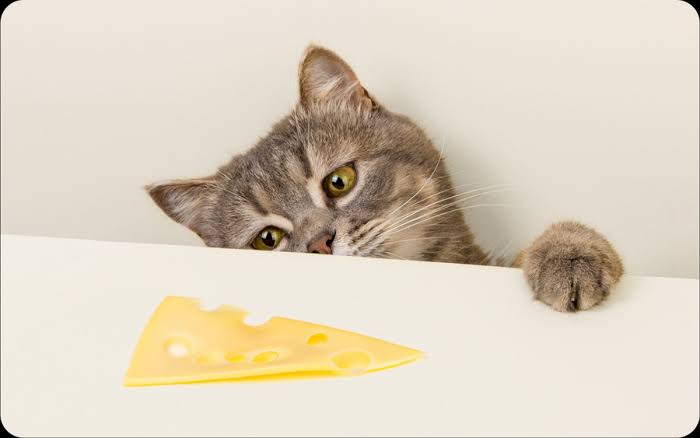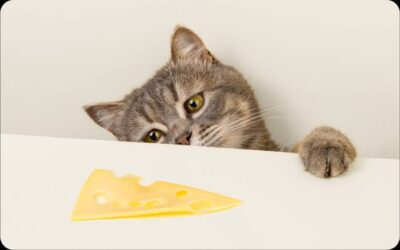
As cat owners, we often find ourselves indulging in snacks and treats while spending time with our feline companions. Occasionally, our cats seem intrigued by the food we eat, and it’s natural to wonder if it’s okay to share certain human foods with them. One common food that many people question is cheese.
After all, it’s a creamy, savory snack that many humans enjoy so can cats have cheese? Is cheese safe for cats, or could it harm them?
In this detailed guide, we’ll explore whether cheese is safe for cats, its potential risks, and what you need to know about offering cheese to your pet.
We’ll also answer some common questions and provide tips for keeping your cat healthy while still indulging in some of your favorite snacks.

Can Cats Eat Cheese?
Yes, cats can eat cheese in moderation, but there are some important considerations you should keep in mind. While cheese is not toxic to cats, it’s not an ideal food for them either. Cats are obligate carnivores, meaning that their bodies are designed to digest meat rather than dairy products.
Unlike humans, who have enzymes that help break down dairy, many adult cats are lactose intolerant, which means they lack the enzyme lactase necessary to properly digest lactose—the sugar found in milk and dairy products like cheese.
Cheese contains small amounts of lactose, depending on the type, so it can cause digestive issues in some cats. The severity of these issues varies from cat to cat, but in general, most adult cats do not have the digestive enzymes required to break down lactose efficiently. However, not all cats will react negatively to cheese, and some may tolerate it better than others.
If you decide to give your cat cheese, it’s important to do so in small amounts and monitor your cat for any signs of discomfort or digestive upset. Let’s take a deeper look at why cheese might not be the best treat for your cat.
Why Cheese Might Not Be Ideal for Cats
While cheese may seem like a fun, tasty snack for your cat, there are several reasons why it might not be the healthiest choice.
1. Lactose Intolerance in Cats
As mentioned earlier, most adult cats are lactose intolerant. This means that they cannot properly digest lactose, which is the sugar found in milk and other dairy products. In fact, many adult cats lack the enzyme lactase, which is responsible for breaking down lactose in the digestive system.
When a lactose-intolerant cat consumes cheese, the lactose may not be fully digested, leading to gastrointestinal issues. Common symptoms of lactose intolerance in cats include:
- Diarrhea: Uncomfortable stomach bloating or excessive gas may cause your cat to have loose stools.
- Vomiting: Cheese may cause some cats to vomit if their stomach cannot handle the lactose.
- Abdominal Pain or Discomfort: Cats may show signs of discomfort such as a hunched posture, restlessness, or frequent grooming as they try to alleviate the discomfort caused by undigested lactose.
While not all cats are lactose intolerant, it’s often safer to assume that your cat might be. If your cat has never had cheese before, it’s best to start with a very small amount and watch for any signs of digestive upset.
2. High Fat and Calories
Cheese is a high-fat food, and it can contribute to your cat’s daily caloric intake quickly. While a small amount of cheese won’t cause immediate harm, feeding your cat cheese regularly can contribute to weight gain and obesity. Obesity is a serious health concern in cats, as it increases the risk of conditions like diabetes, arthritis, and heart disease.
Some types of cheese, such as cheddar or mozzarella, contain high levels of fat and sodium, which may not be suitable for cats. If your cat eats cheese too often, it could lead to an unbalanced diet and negatively affect their health over time.
3. Allergies and Sensitivities
While rare, some cats may have an allergy or sensitivity to dairy products, including cheese. This can result in skin irritations, gastrointestinal issues, or more serious allergic reactions. If your cat is sensitive or allergic to dairy, consuming cheese may cause problems beyond just digestive upset.
4. Disruption of Balanced Nutrition
Cats have specific dietary needs that must be met to maintain optimal health. Cheese, being a dairy product, lacks the essential nutrients that cats need in their diet. Cats require a high amount of animal protein, vitamins, and minerals, which cheese cannot provide in the necessary quantities. Offering cheese as a treat could displace healthier, more nutritious options from your cat’s diet, leading to imbalances over time.
Cheese for Cats: Which Types Are Better?
If you decide to give your cat cheese, there are a few types that are better than others, especially in terms of lower lactose content and fat content. Here’s a breakdown of some cheese options:
- Hard Cheeses (Cheddar, Parmesan, Swiss): These cheeses have lower lactose content than soft cheeses. Hard cheeses are aged longer, which means they contain less lactose. While these cheeses are still high in fat, they are often more tolerable for lactose-intolerant cats than soft cheeses.
- Low-fat Cheeses: Some cheeses, such as part-skim mozzarella, may contain less fat than regular cheeses. Low-fat cheeses are a better choice if you want to treat your cat but keep their calorie intake in check.
- Cream Cheese: This is another option, but it is also quite high in fat and often has added flavorings or ingredients that may not be suitable for cats. It’s best to avoid flavored cream cheeses, such as those with garlic or herbs.
- Cottage Cheese: Cottage cheese tends to have lower lactose levels than other cheeses and may be more tolerable for some cats. However, it’s still important to feed it in moderation and monitor your cat for any adverse effects.
It’s important to remember that while some cheeses might be easier for your cat to tolerate than others, cheese should always be offered in moderation and only as an occasional treat.
How Much Cheese Can Cats Have?
If you choose to offer cheese to your cat, it’s essential to do so in moderation. While a small amount of cheese is unlikely to harm most cats, it should never replace their regular, nutritionally complete diet. Here are a few guidelines to follow when feeding your cat cheese:
- Start Small: If your cat has never had cheese before, start with a very small piece (about the size of a pea or a small bite) and see how they react. This will help you gauge whether your cat has any lactose intolerance or sensitivity to dairy.
- Limit Frequency: Cheese should only be an occasional treat. It should not become a regular part of your cat’s diet. Treats should never exceed 10% of your cat’s daily caloric intake.
- Monitor for Symptoms: Keep a close eye on your cat after they consume cheese. If you notice any signs of digestive upset (diarrhea, vomiting, bloating), it’s best to avoid cheese in the future.
Always consult your veterinarian before introducing new foods to your cat’s diet, especially if they have underlying health conditions like obesity, diabetes, or gastrointestinal issues.
READ ALSO: Pain Medicine for Dogs: Understanding Options, Safety, and Best Practices
Signs That Your Cat May Be Lactose Intolerant
If you choose to give your cat cheese and suspect they may be lactose intolerant, watch for the following signs of discomfort:
- Diarrhea or Loose Stools: The most common sign of lactose intolerance in cats is diarrhea or loose stools shortly after eating cheese or other dairy products.
- Vomiting: Some cats may vomit after consuming cheese if their stomach cannot handle the lactose.
- Excessive Gas or Bloating: A bloated abdomen and gas are other signs that your cat’s digestive system is struggling to process lactose.
- Abdominal Pain or Discomfort: Cats may appear restless, hide more than usual, or exhibit a hunched posture if they are experiencing abdominal pain from consuming dairy.
If any of these symptoms occur, it’s best to avoid giving your cat cheese or other dairy products in the future.
What Are Some Healthier Treat Alternatives to Cheese?
If you’re looking to spoil your cat with a treat, there are many healthier and more appropriate options than cheese. Some great choices include:
- Commercial Cat Treats: There are many cat treats available on the market that are formulated to meet your cat’s nutritional needs. These treats are usually designed to be more easily digestible than human foods like cheese.
- Cooked Meat: Small pieces of cooked chicken, turkey, or beef can make excellent protein-rich treats for your cat. These are much more suited to their carnivorous diet and are less likely to cause digestive upset.
- Catnip: For many cats, catnip is a delightful treat that can offer them some excitement and entertainment without risking any health issues.
- Freeze-dried Meat: Freeze-dried meat treats like chicken or fish are another great, healthy alternative to cheese. They are high in protein and low in fat.
FAQs
Can cheese be harmful to cats?
Cheese is not inherently toxic to cats, but it can be harmful, especially for those who are lactose intolerant. It can cause digestive issues such as diarrhea, vomiting, and abdominal pain in these cats. Additionally, cheese is high in fat and calories, which can lead to obesity if given too often.
What types of cheese are safest for cats?
Hard cheeses like cheddar, Swiss, and Parmesan are generally lower in lactose and may be more tolerable for some cats. However, cheese should still be given in moderation and only as an occasional treat.
How do I know if my cat is lactose intolerant?
If your cat experiences digestive upset (diarrhea, vomiting, gas, or bloating) after consuming cheese, they may be lactose intolerant. Start with a small piece of cheese and monitor for any adverse reactions. If your cat shows symptoms, avoid giving them dairy products in the future.
Can cheese cause long-term health problems in cats?
While a small amount of cheese is unlikely to cause long-term health problems, frequent feeding of cheese can contribute to obesity due to its high fat and calorie content. Over time, obesity can lead to other health issues, including diabetes and joint problems.
Can I give my cat cheese as a daily treat?
Cheese should only be given as an occasional treat, not a daily snack. Treats should not make up more than 10% of your cat’s daily caloric intake.
Leave a Reply
You must be logged in to post a comment.